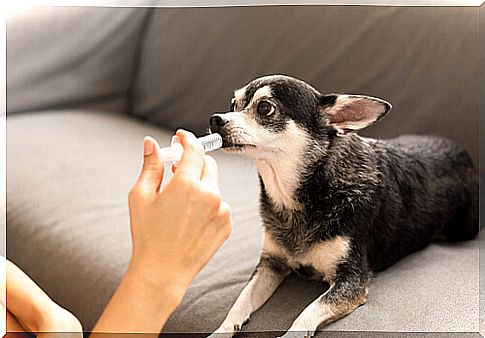Why Self-medicating A Dog Can Be A Dangerous Practice

If taking remedies without a medical prescription is an irresponsible behavior, at least, but typical of people, self-medicating a dog – with veterinary or human products – becomes a decidedly dangerous practice that can put the animal at risk of life or death. So if your furry looks sick, refrain from giving him any kind of medication. Take him to the vet and let him diagnose what is happening to him and then medicate him if necessary.
Risks of self-medicating a dog
When by your decision, or on the advice of someone you know, you give your dog a remedy, what you will surely achieve is to mask or aggravate the animal’s condition.
In addition, by not knowing the appropriate doses, or by assuming that the remedy will cause the same effect on your pet as it does on you, you are making a mistake that can have serious consequences.

TO Some medications that people take directly are toxic to dogs, even if you give a minimal amount. The reason must be found in that humans and pets have different metabolisms. So be very careful with this issue.
To each species its medicine
Throughout history, drugs for humans were used by veterinary medicine. In some cases they are still being used.
But in recent years, the pharmaceutical industry has come a long way when it comes to animals. Currently there are a large number of remedies specifically developed for dogs, with clear indications of the dose, according to the weight of the pet.
In any case, l to Spanish Medicines Agency is authorized to indicate which products can be used or not in animals.
Self-medicate dogs, a common practice
E l medicate fact a dog, unfortunately, is a fairly common practice.
According to the results of a study carried out by the Ibero-American University of Sciences and Technology, based in Chile, almost one in 3 dog owners does not consult the veterinarian before giving their furry a medicine.
The same research shows that 42 percent of those consulted do not go to a professional to give their pet vaccines: they inject them themselves or ask for help from someone close to them with knowledge of medicine or nursing.
Do not humanize your dog when it comes to medicating him
What should also be clear to you when giving medicine to your pet is that your dog is a dog and not a person.
For this reason, the way your body processes and eliminates the substances it incorporates is different from yours.
Thus, some components of drugs designed for humans cannot be disposed of and accumulate in the liver or kidneys of the hairy one. Over time, serious damage such as bleeding can occur that could lead to the death of the animal.
So that the remedy is no worse than the disease

So pay close attention and, once again, don’t humanize your dog.
If ibuprofen works for you, it doesn’t have to be the same for your four-legged friend , even though it is one of the drugs with which owners self-medicate their pets the most.
However, this drug is not licensed by the Medicines Agency for use in dogs.
So, as prevention is always better than cure, consult your vet before giving your furry a medication. It is not going to be that, following the sayings, the remedy is worse than the disease.








